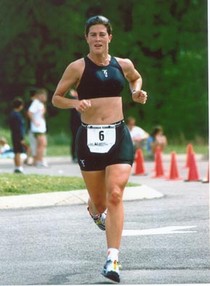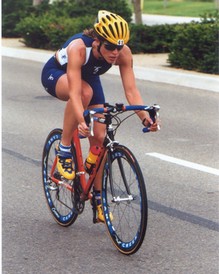|
Click here to buy or sell tickets to any 2005 Major League Baseball game.
Click here to visit our new Rolling Stones concert tickets page
Share your view on Professional Triathletes on SBS' message board at: Rachel Sears and Pro Triathlete's Forum
Interview with SBS Personality and Pro Triathlete Rachel Sears -- by Erin Alders
|
...Where Rachel talks to Erin about the sport, her involvement in it, and its future.
|
 |
| Rachel Sears is one of the country's top female professional triathletes. |
Rachel Susanne Sears (www.rachelsears.com ) began racing at age 13, and competed in running events that included road running, cross country, and track. At 24 years old, she competed in her first triathlon in 1999, and won. She is now 30 years old, and competes professionally in triathlons and duathlons.
A graduate of Syracuse University with a dual B.A. degree in TV/Radio/Film Production and International Relations, she enjoys learning and speaking foreign languages, listening to KGO Radio, doing outdoor pursuits on the water and in the woods, enjoying good music and food, and being around her pets in her free time.
Rachel is a gold medalist in the ITU Duathlon World Championships that were held in Rimini, Italy in 2001. Rachel took time to talk to me about her work and simply being a female athlete.
Erin: How do you retain sponsors, and what kind of sponsors would you like to have?
Rachel Sears: Sponsorship is about relationships and I take mine very seriously. I choose to work with companies who have a product/service that I personally use and believe in. Retaining sponsorship is about nurturing relationships and really understanding the needs of the companies that I work with. I retain my sponsors by caring for our relationship and by thinking outside the box. Communication and strategic thinking to help my sponsors gain exposure, increase their bottom line, or improve their image in my sport are all of great importance. The ideal sponsor is one who recognizes the reciprocal nature of a sponsorship partnership and has an open line of communication and is clear of their expectations. Together we both elevate each other's presence and visibility in the sport.
Erin: What is your yearly budget, and what does it consist of?
Rachel Sears: What budget? I plan my race schedule and take it race by race. I never really know how I am going to get to my next race, but trust that if I want to make it happen, I will.
Typically my expenses run somewhere between $20,000 and $25,000 a year. This includes airfare, lodging, rental cars, airport parking, race entry fees, medical costs, racing licenses, various membership fees, nutrition/supplements, equipment and coaching.
Sponsorship covers a great deal of my equipment needs and more recently, various expenses are covered by race directors or promoters. With every year that passes, the goal is to get closer to breaking even or getting in the black. These first few years, for me, effectively the "start up" years, have has me in the red with a higher expense to income ratio.
Erin: What advice do you have for women athletes who want to go pro?
Rachel Sears: Make your mind up and go for it. The path to the pro ranks is different in every sport, but I think the starting point is the same; a dream and the desire.
I knew I loved being an athlete and believed I could turn pro and be a successful career athlete by utilizing a broad tool box of skills. Athletically, I laid out a 5 year plan to progress to the pro ranks. I followed each of the process goals to get there and turned pro in 3. Now, I spend a significant amount of time mapping my path as an athlete/business woman. I think this is very important for long term success and viability as a pro athlete - especially for women in sports that are considered less mainstream.
Erin: Is there any advice you would like to pass on to younger women pursuing a sport?
 |
| Sears on the bike in Carlsbad, CA |
Rachel Sears: There is a "winning is everything" mentality that is pervasive in our culture. To a degree it is true. However, it is not just performance and results that make a successful career athlete. Work hard to develop your own style, personality and individuality. Great athletes, especially female athletes, who are lackluster and unremarkable, are finished before they start. Work on yourself with the same vigor that you pursue your sport. Never stop learning. Constantly expand your horizons. It is important to develop your writing and speaking skills. Be sure to surround yourself with people from whom you can learn. Eradicate any negative energy or negative people in your life.
Erin: What was your family life like growing up?
Rachel Sears: My folks worked very hard to support my younger brother and I. As a result, we spent a lot of time on our own, especially after school, during school vacations and over the summer. As a latchkey kid, I was very independent and used to taking care of myself.
I came up with crazy ideas, like days filled with running, bicycle riding, swimming and canoeing. Little did I know I would end up doing some of these activities for a career!
What inspired you to race?
My start in athletics was not so illustrious. In my first season of junior high cross country running in Central Square, NY that I spent more time tripping, falling and crying in the mud than anything. At some point, I became fed up with placing in the middle of the pack. I knew I could do better. I put in a solid summer of running and made a huge improvement. That early success was the carrot that motivated me to work harder than anyone else.
Erin: Were your parents supportive when you began to pursue a pro career?
Rachel Sears: They thought I was nuts. Really, when you think about it, my decision to leave my corporate job to go ride a bike was ludicrous. I had a great career going as a national radio rep with D&R Radio of Interep and I tossed it aside to go after a career in a sport that people still misspell.
Erin: Who were/ are your biggest supporters?
Rachel Sears: My high school coach, Scott Love was my original biggest supporter. Without him, I would never have developed into the athlete that I am today. My fifth grade teacher, Dan Gillett, continues to be a great supporter of my athletic pursuits. Throughout high school Mr. Gillett encouraged me to keep on running and racing. Currently, my coach, Philip Casanta is my biggest supporter of my post collegiate athletic career. He has believed in my talents from day one. My parents, though apprehensive about all this, still offer encouragement to go do my best. Lastly, I would be remiss to not mention several of my sponsors, especially those from my earliest days in triathlon, Scott Gix at Oomph!, Joe and LT Ward at Cane Creek Cycling Components, Andrew Weber at Cycling Innovations, along with Steve Johnson and Mark Vandermolen at Profile Design. Each of these gentlemen has believed in me and supported me as I have made my ascent from amateur to professional racing at time that many companies will look the other way.
Erin: How did you support yourself financially when you first started out/ and how do you support yourself now?
Rachel Sears: It has been tough, but anything worth doing isn't easy, right?
Initially, once I left D&R Radio, I worked part time in a San Francisco bike shop. That was a switch. I went from being a suit wearing, finely coiffed sales exec with a fancy financial district office, to a pony tailed, shorts and t-shirt bike shop rat. I was the same girl with the same ambition, but a completely different environment.
Eventually the bike shop went under, after the dot com bust, and I decided to start my own coaching and consulting business, Hypercat Racing. Today, along with my partner, Hypercat Racing helps support my racing and training.
Erin: About how many hours a week do you train?
Rachel Sears: During my transition period between seasons, about one to four weeks of the year, I will do 0-6 hours of activity. However, during the bulk of the year -- December to November -- I will train anywhere from 15-25 hours a week.
This includes swimming, cycling, running and strength training. Sessions like chiropractic work, deep tissue therapy, flexibility and mental training are all supplemental to that 15-25 hour range.
Erin: What is your favorite dessert?
Rachel Sears: I don't get to eat it, but once every few years, because it's a desert featured at a restaurant on the East Coast, but it's called "Death by chocolate."
Erin: What is your favorite song?
Rachel Sears: I worked as a radio on-air personality for 4 years...my head spins with this question.
Probably something that makes me laugh like, Sir Mix O Lot "Baby Got Back!"
Erin: Do you plan to have kids?
Rachel Sears: Yes, once I am married, and probably sooner than later.
Erin: What were your hardest/ or most interesting moments in racing?
Rachel Sears: One of the most difficult/bittersweet moments for me in sport was racing the ITU Duathlon World Championships in Rimini, Italy on 9/16/01.
It seemed odd to be racing just days after 9/11, but the US Team was already in Italy and the event was scheduled to go on. We raced with black armbands and in a bit of fear as we donned our Team USA uniforms. That day I realized the goal of winning an amateur age group world championship title. It was such a contrast of emotions.
In a way, it really didn't matter. Sport really got put in perspective for me at that time.
Erin: What are some of your favorite memories because of racing?
Rachel Sears: Many of my most cherished memories date to the early days of my cross country running career. In New York State we were blessed with true cross country running weather that yielded plenty of mud for racing. I recall running at an Invitational in Baldwinsville, NY where there was so much mud, many runners lost their shoes. It was such a test of physical and mental endurance, but really it was a blast. We looked like mud monsters crossing the finish line. You could see but the white of our eyes!
Erin: How/ when do you want to finish your career?
Rachel Sears: I will always be an athlete. As long as my body will move, I will be involved competing at whatever level I can. I want to finish the competitive part of my career with no regrets. I want to know that I went out there, gave it my best shot and had a great time in the process. My legacy will be to inspire young athletes to pursue their dreams and to continue coaching young athletes and work in the development of future Olympians.
Share your view with SBS. Click on "Comments" below:
|
Click to read the first page of Paris Hilton and Sports Marketing
|
|
|
|